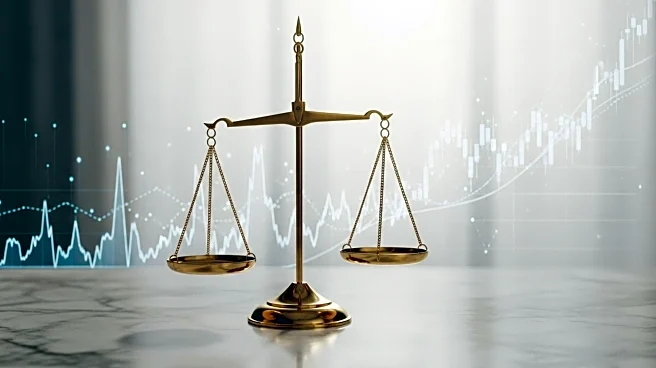What's Happening?
President Trump is actively engaging with the Federal Reserve, aiming to influence its monetary policy decisions. His criticism of the Fed board and Chair Jerome Powell for not lowering interest rates has been persistent. Additionally, Trump has attempted to dismiss Governor Lisa Cook and nominated Stephen Miran, a White House economic adviser, as a Fed governor. These actions are causing concern among investors about the stability and authority of the Federal Reserve. Economists warn that this could lead to increased market volatility over the next six months. The potential changes in the Fed's composition, particularly with the Federal Open Market Committee members possibly deviating from the 'Taylor rule,' are significant factors in this scenario.
Why It's Important?
The actions taken by President Trump could have profound implications for the U.S. economy and financial markets. Investor confidence in the Federal Reserve's independence and authority is crucial for market stability. Trump's maneuvers may undermine this confidence, leading to volatility that could affect economic growth and investment decisions. The potential reshaping of the Fed's structure, including the appointment of regional bank presidents, could further politicize monetary policy, impacting interest rates and inflation management. Stakeholders such as businesses, investors, and policymakers may face uncertainty, affecting strategic planning and economic forecasts.
What's Next?
Looking ahead, the composition of the Federal Reserve may change significantly by next February, with potential political influences affecting the reappointment of regional bank presidents. This could alter the Fed's approach to monetary policy, possibly deviating from established rules like the 'Taylor rule.' Economists and market analysts will closely monitor these developments, assessing their impact on economic indicators and market behavior. The Trump administration's actions may lead to debates on central bank independence and the role of political influence in economic governance.
Beyond the Headlines
The broader implications of President Trump's actions could extend beyond immediate market volatility. The potential politicization of the Federal Reserve raises questions about the long-term independence of central banks and their ability to manage economic policy without external pressures. This situation may prompt discussions on the ethical and legal dimensions of presidential influence over monetary policy, potentially leading to reforms or legislative actions to safeguard the Fed's autonomy.









